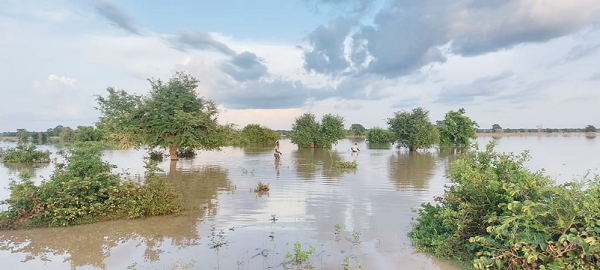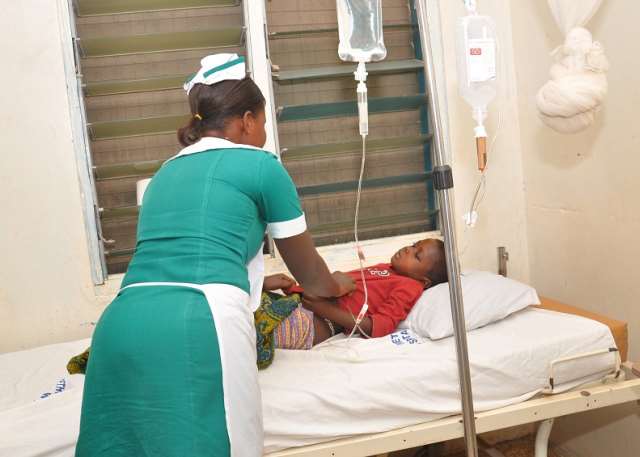The Centre for Climate Change and Food Security (CCCFS) has raised alarm over the early spillage of the Bagre Dam in Burkina Faso, warning that northern Ghana faces another cycle of devastating floods unless urgent reforms are implemented.
In a statement issued on August 26, CCCFS said Burkina Faso’s power utility SONABEL began releasing water from the Bagre Dam on August 25, two days earlier than scheduled, as water levels approached the dam’s maximum capacity. The reservoir now stands at 234.27 metres (90.24% full), less than a metre below its limit. The nearby Kompienga Dam is also nearing its threshold, increasing fears of severe downstream flooding.
Ghana’s Water Resources Commission and the National Disaster Management Organisation (NADMO) have since advised residents along the White and Black Volta rivers to evacuate to higher ground immediately.
Ghana Still Recovering from Akosombo Spillage
The warning comes at a time when many communities are yet to recover from the 2023 controlled spills of the Akosombo and Kpong dams, which displaced more than 35,000 people in the Volta Region. Villages such as Mepe, Battor, and Sogakope remain scarred by the destruction, with many survivors still in temporary shelters.
“To face another flood before the wounds of Akosombo and Kpong have healed is unconscionable,” CCCFS stated. “Ghana is being forced into an annual cycle of destruction that is neither sustainable nor acceptable.”
A Recurring Nightmare
Spillage from the Bagre Dam has historically had devastating consequences for northern Ghana—wiping out homes, farmlands, and livelihoods. Floodwaters often trigger outbreaks of diseases such as cholera, malaria, bilharzia, and, in past years, polio.
The statistics are sobering: in 2007, over 307,000 people were affected and more than 12,000 hectares of farmland destroyed, costing the government upwards of US$25 million. In 2018, 17 lives were lost and nearly 76,000 farms wiped out.
CCCFS insists these repeated disasters expose systemic failures in dam management, governance, and regional cooperation.
Food Security Under Threat
Flooding at harvest time regularly destroys crops and undermines food security. In 2007, the Upper East Region lost an estimated 144,000 metric tonnes of food crops. In 2018, Ghana lost 127 metric tonnes of maize, while Burkina Faso recorded significant rice losses.
Households in flood-hit areas have reported average income losses of GH¢4,000, with some losing over GH¢40,000—devastating for subsistence farmers already on the margins.
“A Governance Crisis”
According to CCCFS, Ghana’s vulnerability is rooted in governance gaps. The Bagre Dam, built in 1993 without Ghana’s input, sits on a shared river but lacks a binding framework for joint management.
Although SONABEL issues notices before releasing water, CCCFS says warnings are often late and not backed by practical support for evacuation. Surveys further show that over 90% of residents in the Volta Basin have never heard of the Volta Basin Authority (VBA), the body meant to coordinate management of shared waters.
“Too many households remain in the path of danger not by choice, but because they lack alternatives,” the organisation noted. “Warnings alone are not enough.”
CCCFS’s Recommendations
The Centre is calling for:
• A binding Bagre–Kompienga Release Protocol under the VBA, including real-time data sharing, spill thresholds, and a joint operations centre during the spillage season.
• Forecast-based financing, so funds are released once climate models predict danger, enabling early evacuation and food security measures.
• A shift in flood communication strategies, using trusted local channels—radio, chiefs, churches, mosques, and social media—to deliver tailored messages.
• Long-term investments in flood buffers, retention basins such as the delayed Pwalugu project, and strict zoning enforcement.
• Social interventions including trauma counselling, farm support, and agricultural insurance to strengthen recovery.
A Call to Action
CCCFS stressed that the Bagre spillage should serve as a turning point.
“This is not just a hydrological issue—it is a governance crisis. Each year of delay leaves the country poorer, hungrier, and less safe,” the statement said.
The organisation urged Ghana, Burkina Faso, the VBA, NADMO, and other stakeholders to act decisively—not just to issue warnings, but to prepare, prevent, and protect lives and livelihoods.














